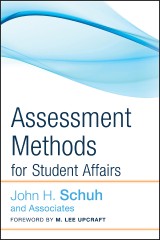Details

Assessment Methods for Student Affairs
1. Aufl.
|
35,99 € |
|
| Verlag: | Wiley |
| Format: | |
| Veröffentl.: | 24.11.2009 |
| ISBN/EAN: | 9780470614778 |
| Sprache: | englisch |
| Anzahl Seiten: | 304 |
DRM-geschütztes eBook, Sie benötigen z.B. Adobe Digital Editions und eine Adobe ID zum Lesen.
Beschreibungen
Editor John Schuh and his fellow contributors, all experts in the field, detail the methodological aspects of conducting assessment projects specifically for the student affairs practitioner who is ready to conduct assessment projects, but is not quite sure how to manage their technical aspects. Using a variety of case studies and concrete examples to illustrate various assessment approaches, the authors lead the reader step-by-step through each phase of the assessment process with jargon-free, hands-on guidance.
<p>Tables, Figures, and Exhibits vii</p> <p>Foreword ix</p> <p>Preface xi</p> <p>About the Author xxi</p> <p>About the Contributors xxiii</p> <p>1. Assessment as an Essential Dimension of Contemporary Student Affairs Practice 1</p> <p>2. Using Existing Databases 23<br /><i>Kevin Saunders and Darin R. Wohlgemuth</i></p> <p>3. Planning for and Implementing Data Collection 51<br /><i>R. M. Cooper</i></p> <p>4. Selecting, Sampling, and Soliciting Subjects 77<br /><i>Ann M. Gansemer-Topf and Darin R. Wohlgemuth</i></p> <p>5. Instrumentation 107<br /><i>Kevin Saunders and R. M. Cooper</i></p> <p>6. Data Analysis 141<br /><i>R. M. Cooper and Mack C. Shelley, II</i></p> <p>7. Writing Reports and Conducting Briefings 171</p> <p>8. Ethics 191</p> <p>9. Using a Mixed Methodological Approach to Assessment: A Case Study 211</p> <p>10. Looking to the Future of Assessment: Some Ideas and Musings 231</p> <p><b>Appendixes</b></p> <p>1. Example of a Focus Group Protocol 249</p> <p>2. Using Microsoft Excel to Develop a Random Sample and a Stratified Random Sample 255</p> <p>3. Listing of Commonly Used Instruments, Purpose, and Information Collected 257</p> <p>4. Computer Syntax Code for Table 6.1 261</p> <p>5. Further Explanation of Table 6.2 263</p> <p>6. Sample Methods Paragraph 265</p> <p>7. Informed Consent Checklist: Basic and Additional Elements 267</p> <p>8. Codes of Ethics of Relevant Professional Organizations to Conducting Assessment Studies in Student Affairs 269</p> <p>Index 271</p>
<p>The Editor <p><b>John H. Schuh</b> is Distinguished Professor of Educational Leadership and Policy Studies at Iowa State University, specializing in higher education and student affairs. He is the general editor of <i>New Directions for Student Services</i> and the author of two best-selling books on assessment in student affairs, and he??has conducted numerous workshops on assessment topics.
<p>Praise for Assessment Methods for Student Affairs</p> <p>"Any student affairs practitioners who are serious about demonstrating that their programs and services make a difference must read this book. After reading the manuscript, I committed to myself to buy a copy of this book for each of the twenty-five departments in our organization. The contents of this book will offer guidance to help student affairs leaders identify appropriate methods to document and explain the outcomes of our work."<br /> —Larry D. Roper, vice provost for student affairs and interim dean, Liberal Arts, Oregon State University</p> <p>"If you want to do better assessment, read this book. Wisdom from more than thirty years of assessment experience is condensed into practical advice, selected case studies, and superb guidelines for the mechanics of doing assessment well. After reading this book, you will design better assessment projects; collect, analyze, and report data more effectively; and your colleagues will act on the results. Oh, and your institution will improve as well."<br /> —Gary R. Hanson, senior research and policy analyst, the University of Texas System</p> <p>"Assessment Methods for Student Affairs is filled with useful advice for any student affairs professional engaged in selecting and implementing assessment methods in his or her practice. The case study examples allow readers to follow practical decision-making steps involved in selecting and applying methods. In addition, the steps for implementation are clearly stated and, if followed, will most likely save many practitioners from mistakes they may have otherwise easily and understandably made."<br /> —Marilee J. Bresciani, associate professor, Administration, Rehabilitation, and Postsecondary Education, and co-director, Center for Educational Leadership, Innovation, and Policy, San Diego State University</p>
Diese Produkte könnten Sie auch interessieren:

Budgets and Financial Management in Higher Education

von: Margaret J. Barr, George S. McClellan

38,99 €
















